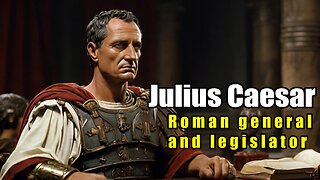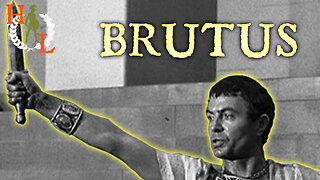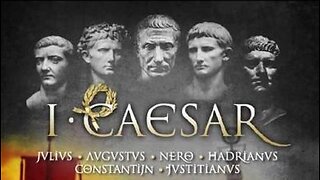Julius Caesar - Columbia Presents Shakespeare
The Tragedy of Julius Caesar is a history play and tragedy by William Shakespeare first performed in 1599. It is one of several plays written by Shakespeare based on true events from Roman history, such as Coriolanus and Antony and Cleopatra.
Set in Rome in 44 BC, the play depicts the moral dilemma of Brutus as he joins a conspiracy led by Cassius to murder Julius Caesar to prevent him from becoming dictator of Rome. Following Caesar's death, Rome is thrust into a period of civil war, and the republic the conspirators sought to preserve is lost forever.
Although the play is named Julius Caesar, Brutus speaks more than four times as many lines as the title character; and the central psychological drama of the play focuses on Brutus' struggle between the conflicting demands of honour, patriotism, and friendship.
The play opens with two tribunes discovering the commoners of Rome celebrating Julius Caesar's triumphant return from defeating the sons of his military rival, Pompey. The tribunes, insulting the crowd for their change in loyalty from Pompey to Caesar, attempt to end the festivities and break up the commoners, who return the insults. During the feast of Lupercal, Caesar holds a victory parade and a soothsayer warns him to "Beware the ides of March", which he ignores. Meanwhile, Cassius attempts to convince Brutus to join his conspiracy to kill Caesar. Although Brutus, friendly towards Caesar, is hesitant to kill him, he agrees that Caesar may be abusing his power. They then hear from Casca that Mark Antony has offered Caesar the crown of Rome three times and that each time Caesar refused it with increasing reluctance, in hopes that the crowd watching the exchange would beg him to accept the crown, yet the crowd applauded Caesar for denying the crown, upsetting Caesar, due to his wanting to accept the crown. On the eve of the ides of March, the conspirators meet and reveal that they have forged letters of support from the Roman people to tempt Brutus into joining. Brutus reads the letters and, after much moral debate, decides to join the conspiracy, thinking that Caesar should be killed to prevent him from doing anything against the people of Rome if he were ever to be crowned.
After ignoring the soothsayer, as well as his wife Calpurnia's own premonitions, Caesar goes to the Senate. The conspirators approach him with a fake petition pleading on behalf of Metellus Cimber's banished brother. As Caesar predictably rejects the petition, Casca and the others suddenly stab him; Brutus is last. At this point, Caesar utters the famous line "Et tu, Brute?" ("And you, Brutus?", i.e. "You too, Brutus?"), concluding with "Then fall, Caesar!"
The conspirators make clear that they committed this murder for the good of Rome, not for their own purposes, and do not attempt to flee the scene. Brutus delivers an oration defending his own actions, and for the moment, the crowd is on his side. However, Mark Antony makes a subtle and eloquent speech over Caesar's corpse, beginning with the much-quoted "Friends, Romans, countrymen, lend me your ears!" In this way, he deftly turns public opinion against the assassins by manipulating the emotions of the common people, in contrast to the rational tone of Brutus's speech, yet there is method in his rhetorical speech and gestures: he reminds them of the good Caesar had done for Rome, his sympathy with the poor, and his refusal of the crown at the Lupercal, thus questioning Brutus's claim of Caesar's ambition; he shows Caesar's bloody, lifeless body to the crowd to have them shed tears and gain sympathy for their fallen hero; and he reads Caesar's will, in which every Roman citizen would receive 75 drachmas. Antony, even as he states his intentions against it, rouses the mob to drive the conspirators from Rome. Amid the violence, an innocent poet, Cinna, is confused with the conspirator Lucius Cinna and is taken by the mob, which kills him for such "offenses" as his bad verses.
Brutus next attacks Cassius for supposedly soiling the noble act of regicide by having accepted bribes. ("Did not great Julius bleed for justice' sake? / What villain touch'd his body, that did stab, / And not for justice?"onlin) The two are reconciled, especially after Brutus reveals that his beloved wife committed suicide under the stress of his absence from Rome; they prepare for a civil war against Mark Antony and Caesar's adopted son, Octavius, who have formed a triumvirate in Rome with Lepidus. That night, Caesar's ghost appears to Brutus with a warning of defeat. (He informs Brutus, "Thou shalt see me at Philippi.")
Antony (George Coulouris) kneels over the body of Brutus (Orson Welles) at the conclusion of the Mercury Theatre production of Caesar (1937–38)
At the battle, Cassius and Brutus, knowing that they will probably both die, smile their last smiles to each other and hold hands. During the battle, Cassius has his serv
-
 1:00:15
1:00:15
Chesterton Radio
3 years agoJulius Caesar - Streamlined Shakespeare
68 -
 3:21
3:21
100 Historical Figures
4 months agoJulius Caesar - Roman general and legislator (100 - 44 B.C.)
32 -
 1:12:48
1:12:48
Heroes and Legends Documentary Channel
2 months agoBrutus: Liberator of Rome or Traitor to Caesar?
7 -
 4:42
4:42
100 Historical Figures
4 months agoWilliam Shakespeare - English playwriter and poet (1564 - 1616)
22 -
 1:21:02
1:21:02
The Audible Wiki Factory
1 year agoCaesar Augustus, also known as Octavian, was the first Roman emperor; he reigned from 27 BC
133 -
 52:10
52:10
The Audible Wiki Factory
1 year agoGaius Julius Caesar, was a Roman general and statesman. A member of the First Triumvirate,
195 -
 20:57
20:57
A Day In History
1 year agoThe Scandalous Life Of Julius Caesar
1161 -
 46:44
46:44
The Audible Wiki Factory
1 year agoMarcus Tullius Cicero was a Roman statesman, lawyer, scholar, philosopher, and academic
90 -
 42:28
42:28
The Audible Wiki Factory
1 year agoWilliam Shakespeare was an English playwright, poet and actor. He is widely regarded as the
179 -
 49:14
49:14
Adaneth - History&Politics
1 year agoI, Caesar | Julius Caesar - I am not King but Caesar (Episode 1)
458